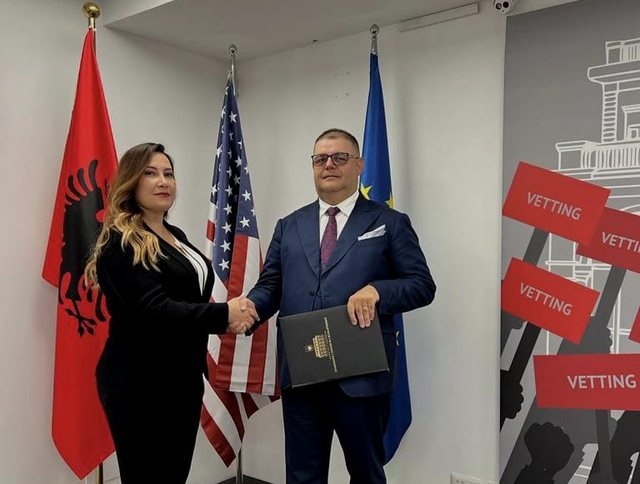
 Flash News
Flash News
Korça/ 40-year-old man jumps from fifth floor balcony, in critical condition
Croatia restores compulsory military service
Illegal constructions in Theth, Manja demands disciplinary proceedings against prosecutor Elsa Gjeli
Details from the murder of Renis Dobra, the perpetrators came with 2 Range Rover cars from Rrëshen
The Supreme Court left him in prison, Meta addresses the 'Constitution'
KPK does not implement the court decision to reveal its private sponsor

In September 2021, the Independent Qualification Commission chose the luxury resort "Marina Bay" on the coast of Vlora as the destination to develop a 4-year analysis of the work as well as the institution's challenges until the end of the mandate.
The event took place on September 30, but the 12 KPK commissioners and three staff members were accommodated in the hotel for two nights thanks to the generosity of a private company that covered the expenses for accommodation, food, conference room rental and other costs. of activity.
KPK kept the donor's name secret in violation of the "Right to Information" law. But almost three years later, the key vetting institution continues to insist on the secrecy of the private sponsor's name, despite a final ruling forcing it to make it public.
The Independent Qualification Commission is a constitutional institution, created within the framework of the Justice Reform for the vetting of judges and prosecutors with the final goal of restoring public confidence in justice.
Throughout his mandate, hundreds of magistrates have been accountable to the KPK and have been penalized with dismissal for gifts or sponsorships received from third parties, which have been assessed in light of a potential conflict or apparent interest. KPK members themselves refuse to submit to the same standard.
The transparency legal saga began with a BIRN Right to Information request and a decision by the Right to Information Commissioner on December 7, 2021, ordering the KPK to make available to BIRN a full copy of the sponsorship agreement.
KPK refused to implement the decision and challenged it in the Administrative Court of Tirana, where it received a favorable decision. In its lawsuit, the Commission claimed that making the sponsor public would harm national security, the vetting process as well as the image of the KPK and its international partners.
The Commissioner for the Right to Information as a defendant and BIRN as a third party in the process appealed to the Administrative Court of Appeal, which overturned the decision of the first instance as unfounded.
In the decision dated January 23, 2024, the Administrative Court of Appeals assesses that the decision of the first instance is a reflection of non-respect of the basic principles of the development of a judicial process.
The appeal also points out in the decision that compliance with the contractual co-confidential clauses does not appear to constitute a limitation provided for in the sponsorship agreement, but was subsequently interpreted as such by the Commission.
Next, the Appeal notes that the Administrative Court of the First Instance has considered the observance of confidentiality clauses to be of public interest, despite the fact that the legislator has provided the public interest as an exception to the right to limit information.
The appeal also refutes the claim that the disclosure of the data of the sponsor of the activity of the KPK constitutes the simultaneous disclosure of important issues related to the activity of this institution in the future, its long-term and short-term strategies and plans.
"This conclusion could have been logically and legally acceptable, only if the plaintiff, during the trial at first instance, had documented the fact that the sponsor of the activity organized by her in a hotel in the south of the country, was sui generis author of the formula for the success of the further activity of the KPK...," the decision states.
Also referring to the jurisprudence of the European Court of Human Rights, Apeli also emphasized the double standard followed by the KPK.
"At a time when this [public] interest is not found to have suffered any harm from the systematic publication of the data of the judges of the Republic of Albania for several years, without excluding their accommodation in hotels, it has even been considered that it has served as an instrument for to restore the public's trust in justice," states the appeal and asks the question: "on what basis the standard of transparency, already applied during the vetting process of judges in office, should not be applied to quasi-judge commissioners as well?".
After clarifying the decision of the Administrative Court of Appeal, BIRN addressed the Independent Qualification Commission with a request for voluntary execution and making available the sponsorship agreement, with complete data.
But the KPK ignored this request and in a response to BIRN described the legislation on which the execution of court decisions is based. Subsequently, the Commission submitted an appeal to the Supreme Court as well as a request for the suspension of the execution of the Appeal decision, until the case is examined at the third level of the judiciary.
On April 30, the Supreme Court decided not to accept the request for the suspension of the execution of the decision, leaving in effect the Appeal decision that compels the KPK to reveal the name of the sponsor.
Two other requests for information addressed to the Independent Qualification Commission for making available the full agreement and the Commissioner for the Right to Information and Protection of Personal Data regarding the progress of the decision execution procedures, have remained unanswered even though it is exceeded the legal deadline. Likewise, the KPK did not respond until the publication of this article to a BIRN request for comment regarding the reasons for not making the requested document available./ BIRN
Latest news


Malltezi: SPAK admits, we are in a process that began with Balla's false report
2025-07-10 22:34:16

Si të çliroheni nga bllokimet emocionale me anë të ushtrimeve
2025-07-10 21:57:24

Lala: Veliaj wanted to return as mayor
2025-07-10 21:40:46

VIDEO/ Brawl in Bolivian parliament, deputies physically clash
2025-07-10 21:20:30


Albania experienced one of the longest heat waves of the last decade
2025-07-10 21:01:09

The Government approves new procedures for declaring residence in e-Albania
2025-07-10 20:39:32

Koka: Northerners will not forget Edi Rama's racist operation in Theth
2025-07-10 20:18:24
The 3 zodiac signs that will be most affected by the 'Full Moon' of July 10
2025-07-10 20:04:49
New director of the National Center of Cinematography appointed
2025-07-10 19:51:12
Korça/ 40-year-old man jumps from fifth floor balcony, in critical condition
2025-07-10 19:40:19
'Tired Woman'/ The Syndrome That Affects Thousands of Women Every Day
2025-07-10 19:34:02
Jane Birkin's original Hermès bag sells for $10 million
2025-07-10 19:26:22

Britain-Ukraine agreement signed for 5,000 Thales missiles
2025-07-10 19:00:25
Fire in Zvërnec, flames endanger two hotels
2025-07-10 18:57:19
Croatia restores compulsory military service
2025-07-10 18:39:01
Spahia: The great truth of the strong accusation of the residents of Theth
2025-07-10 18:35:07


The Supreme Court left him in prison, Meta addresses the 'Constitution'
2025-07-10 17:57:21
New punishment with 'new' regulations
2025-07-10 17:54:46
EU translator fired over fears for Zelenskyy's safety
2025-07-10 17:45:37
'You are a policeman, but not God, take my soul', protest for Agon Zejnullahu
2025-07-10 17:41:21


Video/ Rama repeats the scenario, kneels before Meloni again
2025-07-10 16:56:31
He set fire to a plot of olive trees, 50-year-old man arrested in Shijak
2025-07-10 16:46:19

Rubio: US and Russia have exchanged new ideas for Ukraine peace talks
2025-07-10 16:36:20
Death of 27-year-old, Lipjan Police Commander Resigns
2025-07-10 16:21:28
Video/ An apartment burns in Tirana near the New Bazaar
2025-07-10 16:09:36


Jensila lights up the internet with her birthday greetings to Ledri
2025-07-10 15:42:08
They're full of pesticides! List of 12 products we need to be careful of
2025-07-10 15:31:04

Worker falls from scaffolding in Shëngjin, urgently sent to Trauma
2025-07-10 15:11:03
Malltezi: Within one day they seized my accounts, properties and shares
2025-07-10 15:01:23
EU: Israel has agreed to more aid to Gaza
2025-07-10 14:55:19


Murder of Reni Dobra, 23-year-old's vehicle pulled from the water
2025-07-10 14:29:23
Trump's tariffs on Brazil raise coffee prices
2025-07-10 14:16:07
Ursula von der Leyen survives no-confidence vote
2025-07-10 14:04:27


Fire in Lezha, flames near electrical substation
2025-07-10 13:32:24
Residents clash with police in Theth, a woman faints
2025-07-10 13:24:38
"Rama and Xanun"
2025-07-10 13:15:46

Zodiac signs most likely to get divorced in July 2025
2025-07-10 12:45:51
A scapegoat for an illegitimate Republic
2025-07-10 12:35:02
"He has devastated his own nation"/ Berisha: Rama imprisons his opponents!
2025-07-10 12:26:54

Albanian man injured with knife in Italy
2025-07-10 12:08:55






23-year-old in Mat drowned with rope, 4 suspects are being held
2025-07-10 10:58:53

After the dismissals, the new director of the Shkodra Police is appointed
2025-07-10 10:30:10
BIRN: Rama's action for public spaces, a repeated spectacle
2025-07-10 10:29:11
Action in Theth, Shkodra Police leaders dismissed
2025-07-10 10:16:28
Fatal accident on the Tirana-Durres highway
2025-07-10 10:01:58
The incinerator does not exist, but the government continues to increase funds
2025-07-10 09:51:45
Albania is aging at a rapid pace! 30% of the population is over 60 years old
2025-07-10 09:46:23
End of an era, Modric says 'goodbye' to Real Madrid
2025-07-10 09:36:09
Mount Dukat has been on fire for 6 days, residents request air intervention
2025-07-10 09:27:24

"Poverty on the rise"/ DW: Many people in Germany are not getting paid
2025-07-10 09:08:06
Horoscope, what do the stars have in store for you today?
2025-07-10 08:51:59




The scorching heat returns, the thermometer climbs to 40°C
2025-07-10 07:58:52
Morning Post/ In 2 lines: What mattered yesterday in Albania
2025-07-10 07:46:35
Tourist operator in Theth: They are demolishing our houses without warning
2025-07-09 22:54:57

Trump and Israeli commander warn: Gaza ceasefire could be near
2025-07-09 22:13:21
Fire in Elbasan Landfill, pedagogue: It is a cancer and environmental crime
2025-07-09 21:54:47


Dangerous summer, number of snake bites increases
2025-07-09 21:22:13
Berisha appeals again: Stop state terror against the residents of Theth!
2025-07-09 21:15:36
'Kissing disease' virus linked to several forms of cancer
2025-07-09 21:04:44
Malltezi confesses after release: Justice has become a political weapon
2025-07-09 20:51:48
Vokshi: Albania's EU integration has stalled due to lack of free elections
2025-07-09 20:37:21
